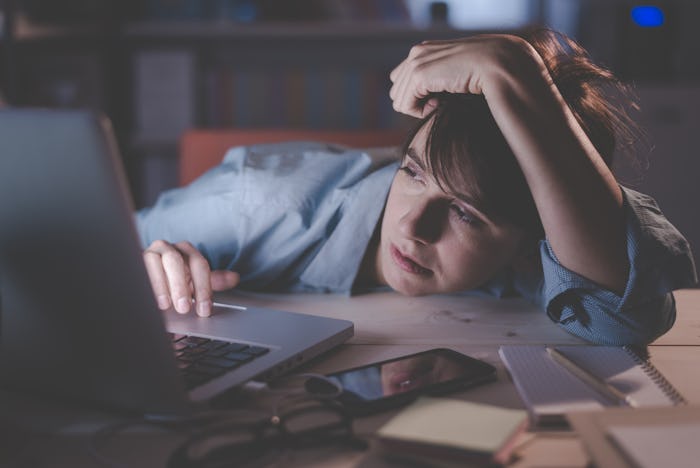Life

You Won't Believe How Postnatal Insomnia Can Affect Your Brain
Postnatal insomnia was my nemesis when my daughter was a newborn. I remember, for the first several months of her life, I just couldn't turn my brain off fast enough to get any sleep between her nightly feedings. I had no idea that postnatal insomnia was a thing until many months later, either, and I really had no idea how postnatal insomnia can actually affect your brain. Turns out, it can become really serious and, in some cases, lead to postnatal depression (also known as postpartum depression) if you don't nip it in the bud.
According to Today's Parent, postnatal insomnia, or postpartum insomnia, is what happens when a parent can't sleep, even though their baby is sleeping soundly. The Baby Sleep Site explains further, saying:
"Moms who struggle with postpartum insomnia often report that they feel on edge, and unable to relax. They anxiously lie awake and listen for their babies, afraid that if they fall asleep, they won’t hear their little ones cry. And when these moms finally do fall asleep? They’re often awoken by the slightest sounds (or even “phantom” sounds that aren’t real.)"
Postnatal insomnia affects women more than men, according to Michigan Health, and can lead to postpartum depression if it's left to create a vicious cycle for too long. The reason for the difference between men and women? According to Michigan Health, hormones, a higher rate of mood disorders, and an overlap in caregiver responsibilities and work (i.e. an unequal distribution of work, parenting, and household chores) put women at a higher risk than men. Reason number 223,555,211 why gender stereotypes and gendered divisions of labor are for the birds.
So how do you know if you've crossed the line from postpartum insomnia into postpartum depression? Psychology Today explains, saying:
"Insomnia associated with postpartum depression is common and is often treated with medication to break the self-perpetuating cycle. This is particularly the case when the insomnia presents as middle of the night referred to as early morning wakening since this type of insomnia is a hallmark symptom of depression. Initial insomnia, characterized by difficulty falling asleep, is often associated with anxious thoughts and ruminations that interfere with the body's ability to unwind and prepare for sleep."
If you're waking in the early hours of the night, it's probably because there's a baby who needs to be fed or changed or soothed. But if you're waking on your own, without a needy baby playing any sort of part, and you're having trouble getting back to sleep, it's worth mentioning to your health care provider (and even your baby's pediatrician during their next well-visit) to ensure that you're not falling into that cycle of anxiety-ridden sleeplessness that can't quit on its own.
If you're finding sleep elusive in your postnatal period, you can start with the basics to reset your body and get it used to falling asleep and staying asleep better. One of the biggest culprits stealing your sleep is likely your phone, according to Psychology Today. Yes, that friendly hand-held device is probably offering you entertainment during those damn late-night feeds, but it's also sending you down a rabbit hole of potential baby crises. If you can manage it, put your phone down as often as possible. It's one of the biggest ways to get your brain off track when it comes to sleep.
The Baby Sleep Site also suggests you watch your caffeine intake, create a soothing bedtime routine, consider using a white noise app and/or machine, trying blackout curtains or an eye mask, trying deep breathing and muscle-relaxing exercises, asking your partner for help, and even relying on non-habit forming sleep aids. In the end and always, though, if you feel as though your trouble sleeping is becoming a potential, larger problem, contact your physician immediately.
Watch Romper's new video series, Romper's Doula Diaries:
Check out the entire Romper's Doula Diaries series and other videos on Facebook and the Bustle app across Apple TV, Roku, and Amazon Fire TV.